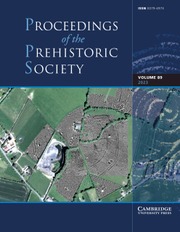Article contents
Kosipe: A Late Pleistocene Site in the Papuan Highlands1
Published online by Cambridge University Press: 06 September 2016
Extract
The presence of an archaeological site on Kosipe Sacre Coeur Mission was first noted in 1960, when axes and waisted blades were found by Father L. Willem during excavations for church foundations. Word of the site was sent to Mr W. Tomasetti, then Assistant District Officer, Department of Native Affairs, Tapini, and he informed White of it. Excavations were made there in June 1964 (White, 1965, 41–3; 1967). In 1966 the site was visited by Crook who collected further carbon and soil samples and in August 1967 White and Ruxton carried out further archaeological and geomorphological investigations. This report covers the entire history of excavations at the site.
Kosipe lies about 135 kilometres north of Port Moresby and 20 kilometres north northwest of the Woitape Sub-District office, Central District, Papua, at 147° 16′ E, 8° 21′ S (fig. 1). The area around Kosipe has not yet been the object of a reconnaissance geological survey. Observations by Crook along the Woitape-Kosipe road, south of Kosipe and on the Kosipe-Tanipai track northwest of Kosipe along the Ivane River indicate that the oldest rocks are slates and other low grade metamorphics of unknown age with steeply dipping foliation. These are overlain, probably sub-horizontally, by several hundred feet of basic volcanics, probably largely basalt. The volcanics are probably of late Tertiary or early Quaternary age; they are strongly dissected and are not obviously related to any centres of extrusion.
- Type
- Research Article
- Information
- Copyright
- Copyright © The Prehistoric Society 1970
References
REFERENCES
- 75
- Cited by


